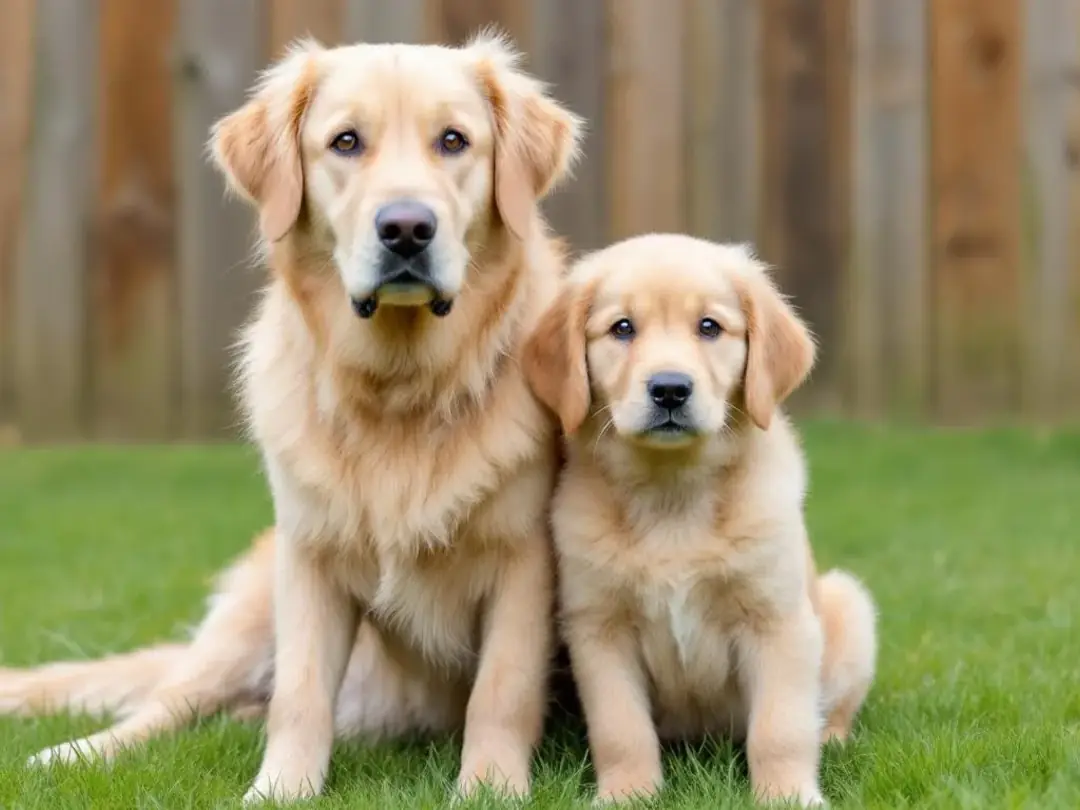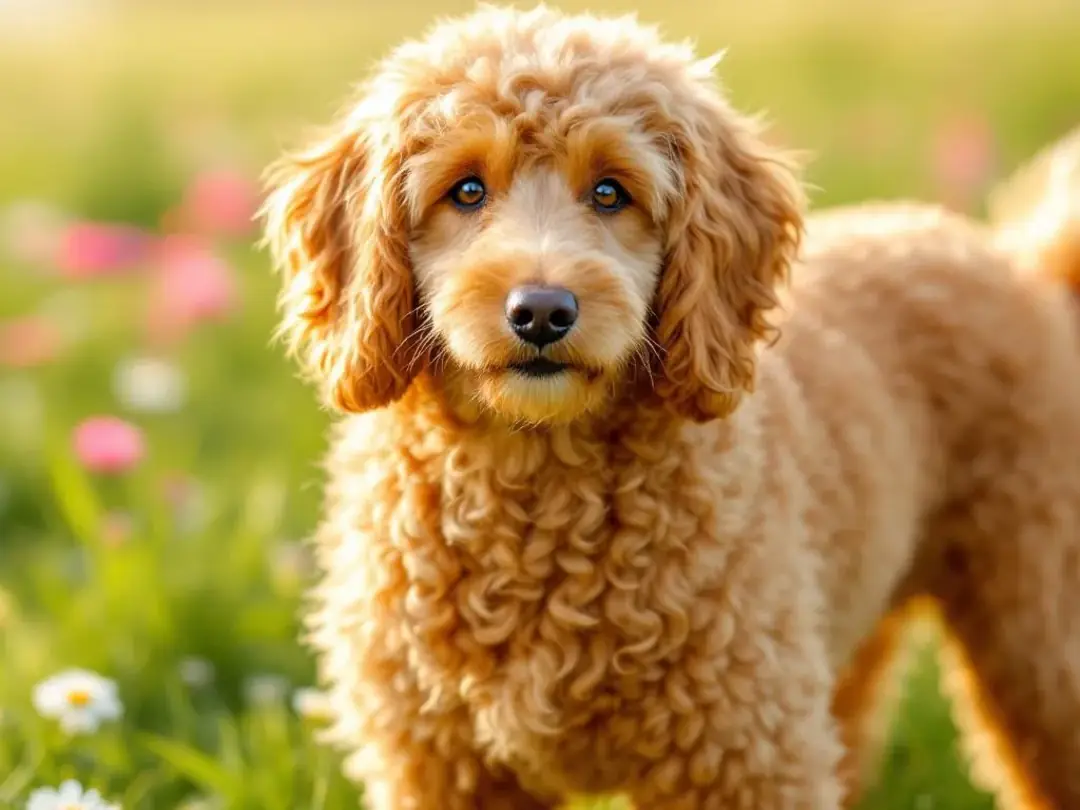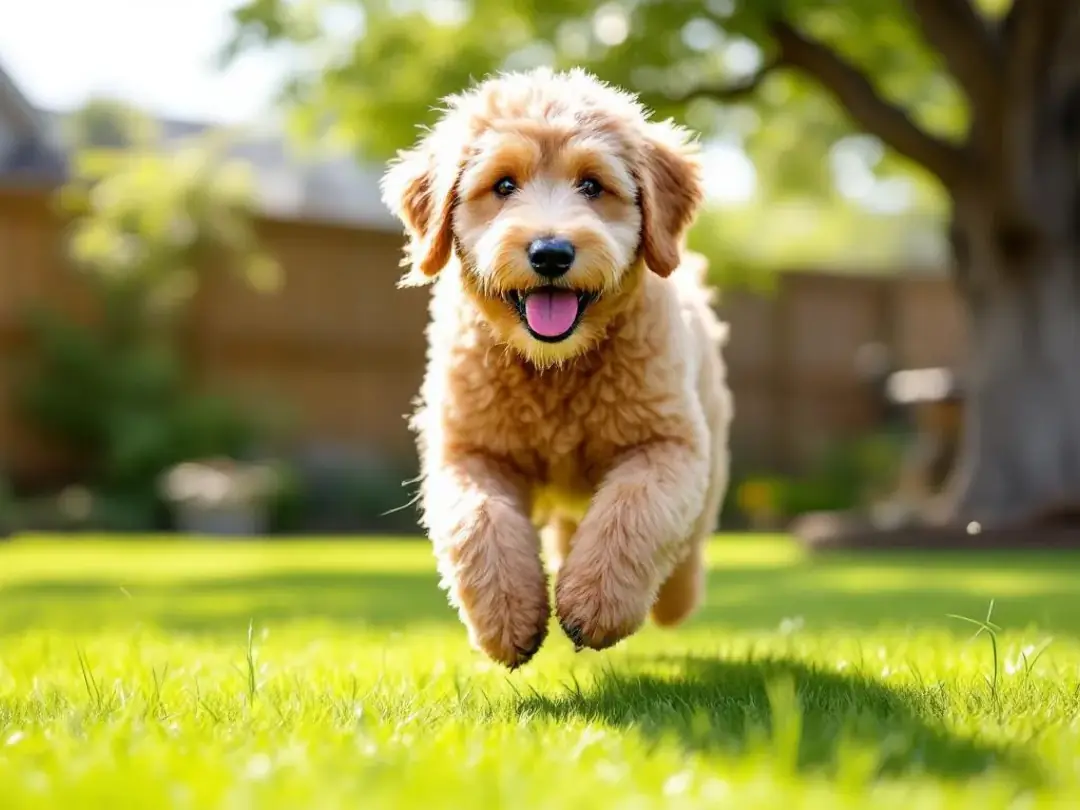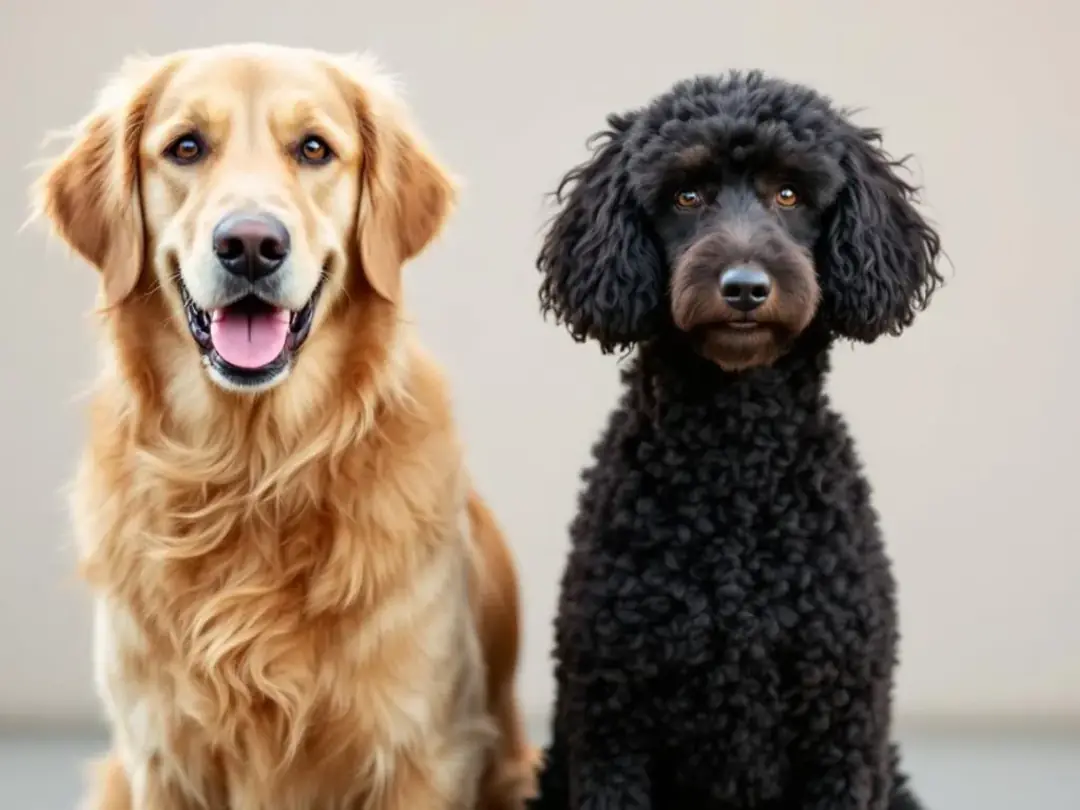Key Takeaways
-
Goldendoodles are a crossbreed between Golden Retrievers and Poodles, first developed in the 1990s
-
They come in three main sizes (Standard, Mini, and Toy) depending on which type of Poodle parent is used
-
This designer mix combines the friendly, loyal nature of Golden Retrievers with the intelligence and low-shedding coat of Poodles
-
Different generations (F1, F1B, F2) result in varying traits and characteristics from each parent breed
-
Goldendoodles inherit health considerations from both Golden Retrievers and Poodles, requiring careful breeding practices
Introduction to Goldendoodles
Goldendoodles are a delightful crossbreed, bringing together the best qualities of the Golden Retriever and the Poodle. Bred to combine the intelligence and low-shedding coat of the Poodle with the friendly, loyal temperament of the Golden Retriever, this relatively new breed has quickly become a favorite among pet parents and active families. Goldendoodles are known for their smart wits, playful personalities, and affectionate nature, making them an adorable mix that fits well into a variety of households. Whether you live in an apartment or a home with a spacious yard, Goldendoodles can adapt and thrive, especially when given plenty of opportunities for outdoor adventures. Their versatility, combined with their loving disposition and manageable shedding, makes them an excellent choice for families seeking a loyal and engaging pet.
What Two Breeds Make a Goldendoodle
A Goldendoodle is created by crossing a Golden Retriever with a Poodle-no other breeds are involved in this specific mixed breed combination. Both the Golden Retriever and Poodle parent must be purebred to produce a true Goldendoodle. The goldendoodle dog is a hybrid breed known for its wavy or curly coat, friendly personality, and popularity as a family pet.
The Poodle parent can be one of three sizes: Standard Poodle (most common), Miniature Poodle, or Toy Poodle. Each size variation affects the final size of the Goldendoodle offspring, but the core genetic combination remains Golden Retriever plus Poodle.
Golden Retrievers contribute their famous friendly temperament, loyalty, and family-oriented nature to the mix. These retrievers were originally bred for hunting and have maintained their gentle mouths, patient personalities, and eagerness to please-traits that make them excellent with children and other pets.
The Poodle parent brings intelligence, trainability, and those sought-after hypoallergenic coat qualities. Both Poodles and Golden Retrievers rank among the most intelligent dog breeds, which explains why Goldendoodles tend to be such quick learners and potentially good service dogs.
This crossbreed combination first gained widespread attention in the 1990s, following the success of other Poodle crosses like the Labradoodle. Breeders recognized that both the Golden Retriever and purebred Poodle offered complementary traits that could address common concerns about pet ownership-shedding, trainability, and temperament.
Understanding Goldendoodle Generations
The generation of a Goldendoodle determines how much genetic influence comes from each parent breed, which directly impacts the pup's characteristics.
F1 Goldendoodles represent the first generation cross: 50% Golden Retriever and 50% Poodle. These dogs often display the most unpredictable mix of traits from both parents, though they typically benefit from hybrid vigor-the tendency for crossbred animals to be healthier than their purebred parents.
F1B Goldendoodles result from breeding an F1 Goldendoodle back to a Poodle parent, creating offspring that are 75% Poodle and 25% Golden Retriever. This generation typically produces curlier coats and reduced shedding, making them more appealing to families concerned about allergies.
F2 Goldendoodles come from breeding two F1 Goldendoodles together. While this maintains the 50/50 genetic split, trait prediction becomes more complex as recessive characteristics from both parent breeds can emerge unexpectedly.
Multigen Goldendoodles represent F3 and beyond combinations. These dogs may be bred from two Goldendoodles of any generation or crossed back to either parent breed, depending on desired traits. Breeders often use multigenerational crosses to achieve more consistent coat types and temperaments.
The generation significantly impacts what traits your Goldendoodle puppy will express. Higher Poodle percentages typically mean curlier coat, less shedding, and potentially more reserved temperament with strangers. Higher Golden Retriever genetics often result in straighter coats, more shedding, and extremely outgoing personalities.


Size Variations Based on Poodle Parent
The size of your Goldendoodle depends entirely on which type of Poodle parent was used in the breeding, since Golden Retrievers maintain fairly consistent sizing.
Standard Goldendoodles result from crossing Golden Retrievers with Standard Poodles. These dogs typically weigh 50-90 pounds and stand 20-24 inches tall. Standard Goldendoodle puppies represent the most common size variation and often work well for active families who want a substantial dog for outdoor adventures.
Medium Goldendoodles (also called Mini Goldendoodles) come from Miniature Poodle parents. These dogs usually weigh 30-45 pounds and measure 17-20 inches tall. Medium Goldendoodles offer a compromise for families wanting Goldendoodle temperament in a more manageable size.
Toy or Petite Goldendoodles result from Toy Poodle parents and typically weigh 15-30 pounds while standing 13-17 inches tall. These smaller pups suit apartment living and families preferring lap-sized companions, though they may retain the exercise needs of both parent breeds.
Size prediction in mixed breed dogs can be challenging, especially in early generations. While breeding a Golden Retriever with a Standard Poodle generally produces predictable sizing, individual puppies may fall outside expected ranges. Miniature Goldendoodles from the same litter might vary significantly in final size.
Pet parents should prepare for size variation when choosing a goldendoodle puppy, particularly from first generation crosses. Responsible breeders can provide size estimates based on parent breeds and previous litters, but guarantees aren't possible with crossbreeds.


Coat Types and Characteristics from Parent Breeds
Goldendoodle coat types reflect the genetic influence of both parent breeds, resulting in three main variations that affect grooming needs and shedding levels.
Straight coats resemble the Golden Retriever parent more closely. These dogs shed more than their wavy or curly counterparts and require regular brushing to manage loose hair. Straight-coated Goldendoodles often have softer, silkier hair similar to Golden Retrievers.
Wavy coats represent the most desired combination of parent breed traits. These dogs typically shed minimally while maintaining easier grooming requirements than curly coats. The wavy texture often provides the best balance of low maintenance and reduced allergen production.
Curly coats lean heavily toward the Poodle parent and produce the least shedding. However, these coat types require professional grooming every 6-8 weeks and daily brushing to prevent matting. Curly-coated dogs often appeal most to families dealing with allergies.
Color variations include cream, gold, red, chocolate, black, and parti-colored combinations inherited from both parent breeds. Golden Retrievers typically contribute golden, cream, and red tones, while Poodles can introduce black, brown, and parti-color patterns.
The term "hypoallergenic" often gets misapplied to Goldendoodles. While many shed less than Golden Retrievers, no dog breed is completely allergen-free. F1B and multigenerational crosses with higher Poodle genetics typically produce fewer allergens, but individual reactions vary significantly.
Regardless of coat type, all Goldendoodles require regular grooming to maintain healthy skin and prevent matting. Professional grooming every 6-8 weeks helps manage coat length and keeps these dogs comfortable year-round.
Temperament Traits from Both Parent Breeds
Goldendoodles inherit a blend of personality traits that make them exceptional family companions, combining the best characteristics from both parent breeds.
From Golden Retrievers, these dogs typically inherit gentle, patient personalities that work wonderfully with children. Golden Retrievers are known for their tolerance, eagerness to please, and natural ability to read human emotions-traits that transfer beautifully to Goldendoodle offspring. Goldendoodles are also generally friendly and social with cats, and early socialization helps ensure they can coexist peacefully with feline housemates.
The Poodle parent contributes high intelligence, alertness, and sometimes a more reserved approach to strangers. While Poodles can be friendly, they often display more discernment than Golden Retrievers when meeting new people, which can create a nice balance in Goldendoodle temperament.
The combined temperament typically produces dogs that are friendly, social, intelligent, and family-oriented. Most Goldendoodles love being part of family activities and can struggle with long periods of isolation. This makes them prone to separation anxiety if not properly trained and gradually accustomed to alone time.
Exercise needs reflect both parent breeds' active heritage. Goldendoodles typically require 30-60 minutes of daily exercise split into multiple sessions. This might include walks, yard play, swimming, or mental stimulation activities. Both Poodles and Golden Retrievers were bred for work, so Goldendoodles need jobs to do-whether that's learning tricks, playing fetch, or participating in agility training.
Social requirements run high in most Goldendoodles. These dogs typically enjoy meeting other dogs and people, though early socialization helps ensure confident, well-adjusted adult temperament. The combination of both parent breeds' social nature means Goldendoodles often serve successfully as therapy dogs or family companions.


Health Considerations from Parent Breeds
Understanding the health background of both parent breeds helps Goldendoodle owners prepare for potential health conditions and work with responsible breeders who test breeding stock.
Golden Retrievers are prone to hip dysplasia, certain heart problems, and higher rates of specific cancers including hemangiosarcoma and lymphoma. These health problems can be passed to Goldendoodle offspring, making health testing of Golden Retriever parents essential for responsible breeding.
Poodles face their own health challenges including progressive retinal atrophy (eye disease), Addison's disease, and gastric dilatation-volvulus (bloat). Standard Poodles also show susceptibility to hip dysplasia, creating overlap with Golden Retriever health concerns.
Common health conditions that may affect Goldendoodles include hip dysplasia from both parent breeds, various eye problems, and gastric issues particularly in larger dogs. The crossbreed nature may provide some protection through hybrid vigor, but doesn't eliminate inherited risks entirely.
Lifespan typically ranges from 10-15 years, influenced by size, genetics, and care quality. Smaller Goldendoodles often live longer than Standard Goldendoodles, following general patterns seen in dog breeds where smaller dogs tend to have longer lifespans.
Responsible breeders perform health testing on both parent breeds before breeding, including hip and elbow evaluations, eye exams, and genetic testing for breed-specific conditions. Pet parents should request health clearances and be willing to pay higher prices for puppies from health-tested parents-this investment often saves significant veterinary costs later.
Regular veterinary care, appropriate nutrition, and maintaining healthy weight help maximize lifespan and quality of life for Goldendoodles. Many health conditions show better outcomes when caught early through routine wellness exams.
Grooming and Ear Care
Goldendoodles are well-loved for their beautiful coats, but keeping them looking their best requires regular grooming. Depending on whether your Goldendoodle has a straight, wavy, or curly coat, grooming needs can vary from weekly to daily brushing. Curly-coated Goldendoodles, in particular, are prone to matting and tangling, so daily attention is essential to keep their fur soft and healthy. In addition to coat care, ear care is a must for this breed. Goldendoodles often inherit floppy ears from their parent breeds, making them more susceptible to ear infections. Regularly checking and gently cleaning your Goldendoodle's ears can help prevent moisture buildup and irritation. Trimming the hair around the ears and eyes not only keeps your pup looking tidy but also reduces the risk of infection and discomfort. With a consistent grooming routine, you'll help your Goldendoodle stay comfortable, healthy, and looking their best.
Exercise Needs
Goldendoodles are an energetic and intelligent breed that thrives on regular activity and mental stimulation. To keep your Goldendoodle happy and healthy, aim for at least 30 minutes of exercise each day. This can include brisk walks, runs, or playtime in the yard. Because Goldendoodles are so smart, they also benefit from activities that challenge their minds, such as agility courses, obedience training, or interactive games like fetch and puzzle toys. These activities not only help burn off energy but also prevent boredom and unwanted behaviors. Goldendoodles love spending time with their families and other pets, making them ideal companions for active households that enjoy outdoor adventures and play. By providing both physical and mental exercise, you'll ensure your Goldendoodle remains a well-balanced and joyful member of your family.
Are Goldendoodles Expensive
If you're considering adding a Goldendoodle puppy to your family, it's important to be aware of the costs involved. Goldendoodles are often considered an expensive breed, with prices for a puppy typically ranging from $1,500 to $5,000 or more, depending on factors like size, generation, coat type, and breeder reputation. Puppies with specific characteristics, such as rare coat colors or hypoallergenic qualities, may command even higher prices. While the initial investment may seem steep, many pet parents find the benefits-such as a low-shedding coat, high intelligence, and loving temperament-well worth it. Goldendoodles are also valued as service dogs, thanks to their trainability and gentle nature, making them a worthwhile investment for those seeking a loyal companion or assistance animal. When choosing a breeder, always prioritize health testing and responsible breeding practices to ensure your Goldendoodle puppy is healthy and well-adjusted.
Living with a High Maintenance Goldendoodle
Goldendoodles are often considered a high-maintenance breed, but with the right care and attention, they make wonderful family pets. Their grooming needs, exercise requirements, and potential for separation anxiety mean that pet parents should be prepared to invest time and effort into their care. Establishing a consistent routine that includes regular grooming, daily exercise, and ongoing training is key to keeping your Goldendoodle happy and healthy. Crate training can be especially helpful for managing separation anxiety and providing your dog with a safe, comfortable space when you're away. Understanding the unique characteristics of Goldendoodles-such as their need for companionship, mental stimulation, and regular coat care-will help you meet their needs and build a strong bond. With patience and commitment, living with a Goldendoodle can be a rewarding experience for the whole family.


Training and Intelligence from Both Breeds
The combination of Golden Retriever and Poodle intelligence creates dogs with exceptional learning capacity and strong desire to work with their humans. Goldendoodles represent the ultimate combination of intelligence and trainability from both parent breeds.
Both parent breeds rank among the most intelligent dog breeds, with Poodles often placing in the top three for trainability and Golden Retrievers consistently ranking in the top ten. This genetic foundation gives Goldendoodles the smart wits needed for complex training and problem-solving. Their intelligence makes it easy to teach commands, tricks, and behaviors using positive reinforcement techniques.
Goldendoodles respond best to positive reinforcement training methods. Their Golden Retriever heritage makes them eager to please, while their Poodle genetics provide the mental capacity to learn complex behaviors quickly. The owner must be committed to consistent, positive training and socialization to ensure a well-behaved, happy companion. This combination often makes them excellent candidates for service dog training or therapy work.
Early socialization and crate training set the foundation for well-behaved adult dogs. Goldendoodle puppies benefit from exposure to various people, animals, sounds, and environments during their critical socialization period. Crate training helps manage separation anxiety tendencies and provides a safe space for frequent meals and rest periods.
Mental stimulation needs run high due to both parent breeds' working heritage. Goldendoodles often excel at activities like agility training, advanced obedience, puzzle toys, and interactive games. Without adequate mental exercise, these intelligent dogs may develop problematic behaviors.
The animal behavior characteristics inherited from both parents make Goldendoodles generally good with other pets and children when properly socialized. However, their size and energy levels require supervision around small children, and their friendly nature means they don't typically make good guard dogs.
Training consistency matters more than duration. Short, frequent training sessions work better than long periods of instruction, especially for puppies whose attention spans are still developing. The key is keeping training positive, challenging, and rewarding to maintain their engagement.
FAQ
Are Goldendoodles considered purebred dogs?
No, Goldendoodles are designer crossbreeds, not purebred dogs recognized by major kennel clubs like the AKC. While they may be registered with hybrid dog registries, they don't have the breed standardization of purebred dogs.
Can you breed two Goldendoodles together?
Yes, F2 generation Goldendoodles result from breeding two F1 Goldendoodles, though traits become less predictable in subsequent generations. Multigen Goldendoodles can continue to be bred together, but careful selection is needed to maintain desired characteristics.
Which parent breed is more dominant in Goldendoodle puppies?
It varies by individual puppy and generation. F1 dogs typically show balanced traits from both parents, while F1B dogs lean more toward Poodle characteristics due to the 75% Poodle genetics. Even within the same litter, puppies can favor different parent breeds.
Do all Goldendoodles have the same temperament?
No, temperament can vary based on which parent breed traits are more dominant, the specific breeding lines used, early socialization experiences, and individual genetics. However, most Goldendoodles share certain traits like intelligence and friendliness.
Are there other Poodle mixes similar to Goldendoodles?
Yes, popular alternatives include Labradoodles (Labrador + Poodle), Bernedoodles (Bernese Mountain Dog + Poodle), and Saint Berdoodles (Saint Bernard + Poodle). Each combination brings different traits from the non-Poodle parent breed while maintaining Poodle intelligence and coat characteristics.






